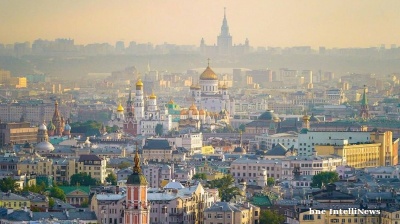Russia’s federal budget deficit fell to $10.6bn, or half a percent of GDP, below projected 0.8% forecast
__2.png)
Russia’s federal budget deficit for the first half of 2024 amounted to RUB929bn ($10.6bn), or just 0.5% of GDP, well below the 0.8% of GDP forecast for the full year according to preliminary figures released by the Finance Ministry on July 9. (chart)
"In January-June 2024 the federal budget was running a deficit amounting to RUB929bn, which is RUB1.421 trillion lower than in the same period last year. Consequently, the federal budget is executed in accordance with parametres of primary structural deficit determined by the law on the budget, while transactions on use/formation of funds of the National Wealth Fund are carried out within the fiscal rule mechanism," the Finance Ministry stated.
Russia reported a cumulative budget deficit of minus RUB983 trillion in May, which means the month-on-month budget actually earned a small surplus in May of RUB52 trillion ($591mn). (chart)
Projected budget deficit falling
Russia's detractors have been hoping that extreme sanctions will gut the Kremlin’s ability to earn money for its war in Ukraine, but Russia’s economy has proven to be resolutely dynamic.
Last year the budget deficit came in at 1.9% of GDP, which disappointed the architects of sanctions that were hoping the twin oil sanctions imposed on December 5, 2022 and February 5, 2023 would balloon the budget deficit to 3-6% of GDP. It didn’t happen as oil revenues quickly recovered in the second half of 2023 and Russia successfully reorientated its hydrocarbon exports to Asia.
The Ministry of Finance is a lot more optimistic about this year’s deficit, despite constantly increasing military spending, and is forecasting the deficit will fall to 0.8% of GDP, before turning in a balanced budget in 2026.
Oil and gas revenues
Russia's oil and gas revenues grew by more than 50% over the period as OPEC restrictions push up the prices. In June of last year, oil and ga revenues amounted to RUB529bn. This year, the expected revenue is RUB814bn.
Russia’s federal budget revenues from the oil and gas sector climbed by 68.5% in January-June y/y to RUB5.7 trillion rubles ($64.8bn), the Finance Ministry reported on its website.
"Oil and gas revenues amounted to RUB5.698 trillion rubles, having surpassed the amount in the same period last year (by 68.5% y/y), largely due to growth of prices for Russian oil. Meanwhile oil and gas revenues were at a level exceeding their base amount, and in accordance with parameters of the social and economic development outlook a stable excess of oil and gas revenues over their base amount is also expected in coming months," according to the ministry, reports TASS.
However, the ministry added that changes in the social and economic development outlook, amendments to the federal law on the budget suggest a certain decline in the estimation of additional oil and gas revenues (directed to the National Wealth Fund at the end of the year) in 2024, the ministry noted.
"Accumulation of extra oil and gas revenues during the periods of favourable price environment and the use of the funds of the National Wealth Fund (NWF) for covering the shortfall in oil and gas revenues in accordance with the fiscal rule’s parameters ensures the immunity of the budget system to fluctuations in the flow of oil and gas revenues," the report said.
Overall, for January-April 2024, oil and gas revenues in the budget increased by 82% and are comparable to the record levels of 2022. Reuters explains this phenomenon as being due to the ineffective G7 price caps and the increased prices caused by Western sanctions.
The Russian Ministry of Finance expects additional oil and gas revenues from the Russian budget in July in the amount of RUB145.3bn ($1.66bn).
Over the first five months of the year, oil export earnings have averaged $17.3bn (vs. $16.7bn in second half of 2023). Budget revenues have remained broadly stable and stood at RUB870bn per month on average in January-May 2024. The increase in January-May 2024 vs. the first half of 2023 is pronounced—22% for exports and 76% for budget revenues.
Non-oil and gas revenues
Overall, budget revenues for the first half of this year reached RUB17.093 trillion ($195bn), marking a 38% increase from the previous year. Expenditures rose by 22.3% to RUB18.022 trillion ($205bn). Domestic tax collections, of which the lion’s share is from VAT, is running well ahead of oil and gas revenues as the Russian economy booms on the back of the military Keynesianism bump from the war spending.
Non-oil and gas revenues of Russia’s federal budget increased by 26.6% in January-June 2024 y/y to RUB11.4 trillion rubles ($129.6bn), the ministry added.
"Non-oil and gas revenues of the federal budget amounted to RUB11.395 trillion rubles, having increased by 26.6% compared with the same period last year.
“Turnover taxes, including VAT, rose by 17.6% in January-June, exceeding the planned level, which creates a stable basis for further advanced growth of revenues,” the ministry added.
The ministry highlighted the execution of instructions on implementing the President’s Address to the Federal Council, including the financing of development programs and the formation of a financial plan for 2025-2030.
The Ministry of Economy recently upgraded its economic outlook for 2024, forecasting economic growth of 3.8% for this year, more than the 3.6% of growth reported in 2023. Amendments to the federal law on the budget suggest a respective increase in non-oil and gas revenues as well, according to the ministry.
Data

India’s retail payment revolution
India’s payments landscape has reached a pivotal stage, with digital transactions now accounting for 99.8% of all retail payments.

Military aid for Ukraine falls despite new Nato PURL initiative – Statista
The Kiel Institute for the World Economy found that military aid to Ukraine dropped sharply in July and August compared to previous months, despite the implementation of the Nato PURL initiative.

IMF cuts Russia’s 2025 growth forecast to 0.6%, leaves Ukraine's unchanged at 2%
The International Monetary Fund has lowered its forecast for Russia’s economic growth in 2025 to just 0.6%, marking the second-steepest downgrade among major economies, even as it raised its global outlook.

Russia's PMI indices plummet as economy cools
Russia’s private sector entered deeper contraction in September, as both services and manufacturing activity declined, according to the latest PMI data published by S&P Global.


